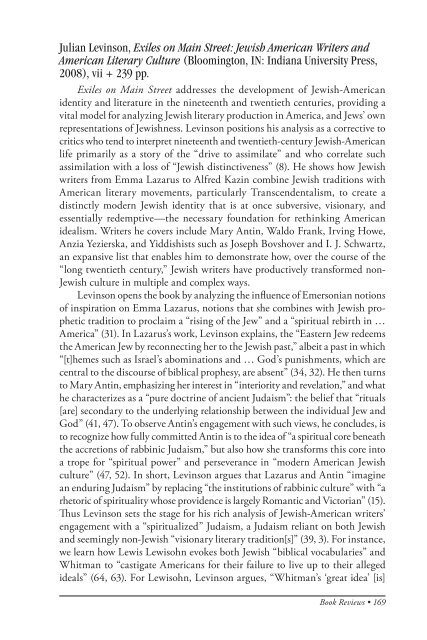The American Jewish Archives Journal, Volume LXI 2009, Number 1
The American Jewish Archives Journal, Volume LXI 2009, Number 1
The American Jewish Archives Journal, Volume LXI 2009, Number 1
Create successful ePaper yourself
Turn your PDF publications into a flip-book with our unique Google optimized e-Paper software.
Julian Levinson, Exiles on Main Street: <strong>Jewish</strong> <strong>American</strong> Writers and<br />
<strong>American</strong> Literary Culture (Bloomington, IN: Indiana University Press,<br />
2008), vii + 239 pp.<br />
Exiles on Main Street addresses the development of <strong>Jewish</strong>-<strong>American</strong><br />
identity and literature in the nineteenth and twentieth centuries, providing a<br />
vital model for analyzing <strong>Jewish</strong> literary production in America, and Jews’ own<br />
representations of <strong>Jewish</strong>ness. Levinson positions his analysis as a corrective to<br />
critics who tend to interpret nineteenth and twentieth-century <strong>Jewish</strong>-<strong>American</strong><br />
life primarily as a story of the “drive to assimilate” and who correlate such<br />
assimilation with a loss of “<strong>Jewish</strong> distinctiveness” (8). He shows how <strong>Jewish</strong><br />
writers from Emma Lazarus to Alfred Kazin combine <strong>Jewish</strong> traditions with<br />
<strong>American</strong> literary movements, particularly Transcendentalism, to create a<br />
distinctly modern <strong>Jewish</strong> identity that is at once subversive, visionary, and<br />
essentially redemptive—the necessary foundation for rethinking <strong>American</strong><br />
idealism. Writers he covers include Mary Antin, Waldo Frank, Irving Howe,<br />
Anzia Yezierska, and Yiddishists such as Joseph Bovshover and I. J. Schwartz,<br />
an expansive list that enables him to demonstrate how, over the course of the<br />
“long twentieth century,” <strong>Jewish</strong> writers have productively transformed non-<br />
<strong>Jewish</strong> culture in multiple and complex ways.<br />
Levinson opens the book by analyzing the influence of Emersonian notions<br />
of inspiration on Emma Lazarus, notions that she combines with <strong>Jewish</strong> prophetic<br />
tradition to proclaim a “rising of the Jew” and a “spiritual rebirth in …<br />
America” (31). In Lazarus’s work, Levinson explains, the “Eastern Jew redeems<br />
the <strong>American</strong> Jew by reconnecting her to the <strong>Jewish</strong> past,” albeit a past in which<br />
“[t]hemes such as Israel’s abominations and … God’s punishments, which are<br />
central to the discourse of biblical prophesy, are absent” (34, 32). He then turns<br />
to Mary Antin, emphasizing her interest in “interiority and revelation,” and what<br />
he characterizes as a “pure doctrine of ancient Judaism”: the belief that “rituals<br />
[are] secondary to the underlying relationship between the individual Jew and<br />
God” (41, 47). To observe Antin’s engagement with such views, he concludes, is<br />
to recognize how fully committed Antin is to the idea of “a spiritual core beneath<br />
the accretions of rabbinic Judaism,” but also how she transforms this core into<br />
a trope for “spiritual power” and perseverance in “modern <strong>American</strong> <strong>Jewish</strong><br />
culture” (47, 52). In short, Levinson argues that Lazarus and Antin “imagine<br />
an enduring Judaism” by replacing “the institutions of rabbinic culture” with “a<br />
rhetoric of spirituality whose providence is largely Romantic and Victorian” (15).<br />
Thus Levinson sets the stage for his rich analysis of <strong>Jewish</strong>-<strong>American</strong> writers’<br />
engagement with a “spiritualized” Judaism, a Judaism reliant on both <strong>Jewish</strong><br />
and seemingly non-<strong>Jewish</strong> “visionary literary tradition[s]” (39, 3). For instance,<br />
we learn how Lewis Lewisohn evokes both <strong>Jewish</strong> “biblical vocabularies” and<br />
Whitman to “castigate <strong>American</strong>s for their failure to live up to their alleged<br />
ideals” (64, 63). For Lewisohn, Levinson argues, “Whitman’s ‘great idea’ [is]<br />
Book Reviews • 169

















